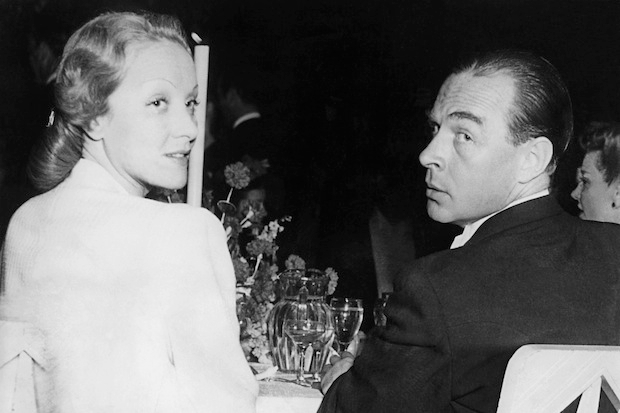I used to see him in El Morocco, the most famous nightclub of its era during the late Fifties and early Sixties. He was a very handsome man, beautifully tailored and with impeccable old-fashioned manners, and a heavy drinker. Wine, champagne and cognac were his drinks, and vodka later in the night. Although invited to sit at the owner’s table, where only unaccompanied men were permitted, he was never without female company, and what beauties they were. I had made the cut early on, but was never lucky enough to be at that particular table when he was there, and I was too shy back then to go up to him and introduce myself.
He was the author of Im Westen nichts Neues, known to the rest of the world as All Quiet on the Western Front. Erich Maria Remarque was a prolific novelist, a very rich man who collected Impressionists and good art as obsessively as he collected women, a man snubbed by anti-Nazi writers such as Stefan Zweig and Thomas Mann, but one whose sister was beheaded by the Nazis because of her loyalty to him. Unlike the snubbers, Remarque had spent three years close to the front, had been wounded three times, and had heroically carried a comrade who was severely wounded to safety, only to discover his buddy was dead on arrival. His fictional hero, Paul Baumer, does the same thing in All Quiet just before his own death.
I would bet my bottom dollar that George W. Bush, and certainly the war criminal and liar Tony Blair, and that mini-buffoon Napoleon-wannabe François Hollande, haven’t read many war books written by those who saw combat up close. Maybe Obama has and that’s why he’s holding back, but I doubt it very much. Uncle Tom’s Cabin seems to be his bible. When All Quiet came out in 1929, it ran to 43 separate printings, one-and-a-half million copies sold in German alone, book club editions in every country in the world, and translations in 39 languages, from Afrikaans to Zulu. (The Yiddish version was translated by Isaac Bashevis Singer.) Soldiers from both sides said that the novel included everything, absolutely everything that they had experienced out there. Perhaps that is why Zweig and Mann had not bothered to answer Remarque’s letters. They wrote fantasies, he wrote it as it was. And even back then, winners were not appreciated, especially rich, handsome winners who had beautiful women at their beck and call.
Remarque fled the Nazis in 1933, becoming a haunted, restless, exiled novelist, playwright and screenwriter over the next 37 years, until his death in 1970 aged 72. Although married to Jutta, whom he left very comfortably off, he had a string of mistresses today’s lowlifes would sell Aladdin’s Lamp for. I’ll drop just a few of them: Greta Garbo, Lupe Vélez, Marlene Dietrich, Clare Boothe Luce, Sylvia Ashley Fairbanks, Dolores del Rio, Greer Garson, and countless others whose names now don’t mean a thing, but who were beauties of the time. Wow! When did he find the time to write Arch of Triumph, A Time to Love and a Time to Die, Black Obelisk, Spark of Life and many others while seducing Paulette Goddard, whom he eventually married and who became his widow. Remarque remained tortured, prolific and a womaniser all his life, the way writers should be but seldom are. (Today’s American and British bunch are neurotic boy scouts by comparison, navel-gazing narcissists scribbling about bodily fluids and self-abuse.)
Once I had finished reading about Erich, I turned south and took up his opposite as far as taking refuge in nationalism and longing for a more heroic era is concerned. Gabriele D’Annunzio resembled Remarque only in their womanising, although the latter far outstripped the Italian braggart in looks and overall numbers. Hughes-Hallett’s biography of the Italian poet is the third one I’ve read, and it has made me revise my opinion of that particular show-off. Philip Julian’s bio of long ago had put the Italian in my pantheon of heroes, though he was later diminished a bit by John Woodhouse’s even-handed study, now gone down the drain altogether. D’Annunzio fornicated, took lots of drugs, ran up enormous debts, and relentlessly promoted himself. He was, however, a wonderful poet while hobnobbing with the rich and famous. And he did fight capitalism’s excesses, and promote his country’s dignity, law and order and economic development. He was the father of fascism before Mussolini, although as my friend Andrei Navrozov wrote in Chronicles, ‘He was a social climber compared with the likes of whom Cecil Beaton resembled a Franciscan friar.’
He sounds trivial all right — interior decorating was his lifetime obsession — but Nietzsche was his God, turning him most of the time into an egomaniacal fool. Unlike the German writer, the Italian was a frightful gnome, with no hair and green teeth. And he preached war at all times. That’s why I loved him when I was young, and now love the German’s pacifism. But in today’s egalitarian epoch, with the drab, colourless PR-fashioned culture of nobodies, both writers emerge as supermen, their foibles forgiven, their pretensions excused.
Imitation is the poor man’s creation, and I’m about to be poor — I am almost ready to order a new boat — so last week I imitated Remarque and D’Annunzio by going to a chic dinner party at a friend’s house, drinking two bottles of Léoville-Las Cases 1982, followed by a bottle of vodka. The mother of my children discovered me somewhere in the house bleeding from the head. Knocked out cold. The next morning I had never felt better. And have outlived those two already







Comments